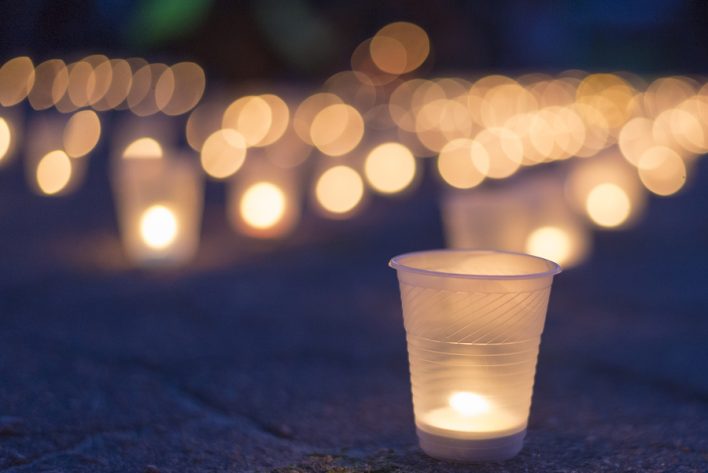Advice
Coping with loss at Christmas
Updated: 06 December 2018

Christmas can be a difficult and challenging time for those who have been bereaved.
There is the loneliness, the pain, the inability to engage with all the fun and frivolity that is synonymous with this normally joyous season. Every Christmas song we hear on the radio, every advertisement we see on the TV is a painful reminder that it will be different this year.
For many, there may be the Empty Chair at the Christmas table to cope with. It may no longer be possible to carry on with certain traditions as the person who was such a part of these traditions has died.
Did your loved one cook the Christmas Dinner, or did they take responsibility for finding the Tree and putting it up along with all the other decorations? Suddenly, these tasks have to be taken on by somebody else and nothing will ever be the same again.
If it was a little child who died, there may be no Santa this year. And even if there is, it will not be the same. Your loved one has died. You are lost in your grief.
I would like to share some tips with you on how to survive Christmas following the loss of a loved one.
- Remember, “You are the Expert on your own Grief” (David Kessler)
- Break with traditions even if it is just for one year. Why cook a turkey and all the trimmings if you are not in the humour to eat it? It is ok to indulge in something simple like soup and a toasted sandwich if that is what you feel like doing. Do what feels right for you.
- Create new traditions. It may help to have a framed photo of your loved one on the sideboard with a candle lighting beside it.
- Another new tradition may be visiting the grave on Christmas morning. This can help you to feel closer to the person who died. Placing a lantern with a candle lighting in it on the grave may also bring comfort. Add a sprig or two of Holly or perhaps a potted plant.
- Children can be the forgotten grievers. (David Kessler). Be honest with your children when it comes to grief. They need to know that it is normal to cry when feeling sad, and that it is ok for them to cry too. Having a cry together can bring some comfort to you both.
- Remember there are no ‘Shoulds’ when it comes to celebrating Christmas. Do what feels right for you, not what other well-meaning family or friends may feel is right for you. You are trying to cope with the fact that your loved one is dead and Christmas will never be the same again. Be true to yourself.
- There are exceptions to every rule. For some people, this Christmas might be the first one in years where they feel truly able to take part in the festive season. It may be that the person who died was an abusive spouse, partner, elderly parent, sibling, and now they are ‘free’. If you have been in an abusive relationship for years where alcohol, violence, and/or emotional abuse played a significant role in the festive season, then know that it is ok to feel happy & carefree, and you have a right to truly immerse yourself in all that the Season has to offer. You may grieve that your relationship was never what you would like it to have been, and that is normal. Acknowledge it and then let it pass.
- Approximately 10% of people need grief counselling. If the thought of Christmas overwhelms you, if it feels too much for you to have to bear, then it may help you to talk to somebody. Counselling offers you a safe and confidential space where you can ‘be yourself’. Remember you are never alone in your grief.
Written by Claire Bernadette Forde
MENTAL HEALTH PROFESSIONALS WORKING WITH Bereavement / Loss ISSUES:
Approach: Gestalt Therapy , Humanistic & Integrative Psychotherapy , Person-Centred Therapy , Somatic Experiencing , Solution-Focused Brief Therapy
Works with: Individual Session
Specialities: Anger , Anxiety , Bereavement / Loss , Depression , Domestic Violence / Abuse , Isolation / Loneliness , Personal Development , Self Care , Self-Esteem , Stress , Suicidal Ideation / Self Harm , Trauma , Work Issues, Work/Life balance
Next avaialble appointment: 8:00 25 February 2025
Approach: Cognitive Behavioural Therapy (CBT) , Humanistic & Integrative Psychotherapy , Mindfulness , Person-Centred Therapy
Works with: Individual Session
Specialities: Anxiety , Bereavement / Loss , Depression , Isolation / Loneliness , Personal Development , Self-Esteem , Stress , Trauma , Work Issues, Work/Life balance
Next avaialble appointment: 9:00 24 February 2025
Approach: Cognitive Behavioural Therapy (CBT) , Humanistic & Integrative Psychotherapy , Person-Centred Therapy , Psychodynamic Therapy , Mindfulness
Works with: Individual Session
Specialities: Anxiety , Bereavement / Loss , Depression , Isolation / Loneliness , Personal Development , Relationship issues , Self-Esteem , Stress , Suicidal Ideation / Self Harm , Trauma , Other
Next avaialble appointment: 13:00 24 February 2025
NEXT ARTICLE
Eating Disorders
Search
Get The Support You Need
From One Of Our Counselors
News
Isolation
Anxiety
Depression
Relationship Issues
Counselling
Personality Disorder
Addiction
Trauma
Children and Adolescent
Anger
Bereavement
Chronic Illness
Communication Issues
Eating Disorder
Post natal depression
Stress
LGBTQI+
Panic Attack
OCD
Resilience
Parental support
Men's Mental Health
Category List
All Posts
News
Isolation
Anxiety
Depression
Relationship Issues
Counselling
Personality Disorder
Addiction
Trauma
Children and Adolescent
Anger
Bereavement
Chronic Illness
Communication Issues
Eating Disorder
Post natal depression
Stress
LGBTQI+
Panic Attack
OCD
Resilience
Parental support
Men's Mental Health

